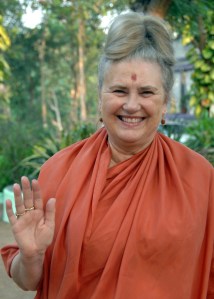If I was to write a short biography I would say: I did and learned some insignificant things until I met the Guru who transformed my life and woke me up to the true meaning of life and to my own Self.
‘Who am I’ was a burning question when I was a young woman. I think this is the most crucial question to ask if you want to have a life of meaning and spiritual purpose. Of course I am not the only person to struggle with identity issues. I feel fortunate though to have been able to find teachers who understood the true meaning of that question and who had the capacity to awaken and guide me toward the goal of my yearning.

The world offers too many temptations. I dabbled in them for a time but my heart turned dry and my mind became confused. And then I had a dream. I woke up one morning to the sound of a celestial bell ringing. I was in a large courtyard surrounded by beautiful trees, with hundreds of people dressed in white robes chanting. I was also in white. I recognised the sounds of the chant but did not know the words. A message came, ‘Wake up, change or die.’ That was the beginning of my journey toward the Guru.